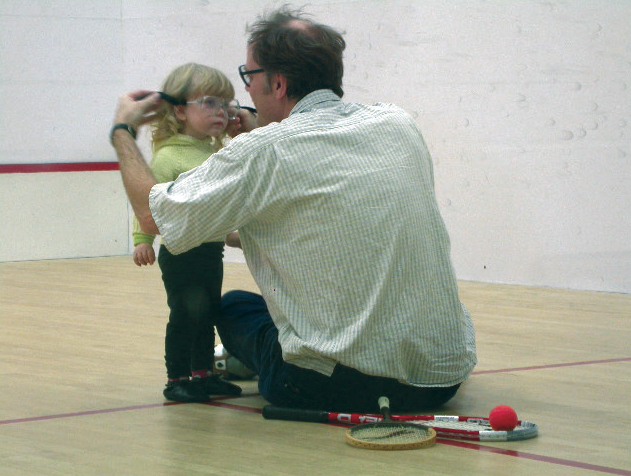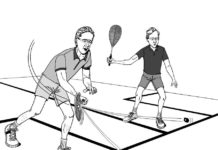By Rod Symington, WSF Referees and Rules Committee
In a Letter to the Editor (P. 4), there is an account of a controversy that arose in the fifth game of the 5.5. Final of Minnesota’s “Indian Summer Tournament” that raises a good but relatively obscure question:
Early in the fifth game, one of the players chose to take off his protective glasses, which were mandatory for all players. Though his opponent noticed immediately, and spoke to the offending player about it, the offender managed to play the middle section of game five without glasses. […] This gave him a clear, and unfair, advantage. The Canadian referee, inexcusably, decided not to make an issue of it. As fate would have it, the Tournament Director, who would normally have been the referee for the final, was playing in the Mixed Doubles final at the same time. Perhaps 10 rallies were played before the Tournament Director noticed the infraction, during which the offender was able to gain a critical 6-3 lead.
What would have been the proper action for the Director to take? Replace the referee? Award a conduct penalty of a point, game, or match? Have the points in question replayed? Thoroughly agitated, he demanded that the offender put his glasses on immediately, which he then did. The offender went on to win game five 9–4.
 The quick answer to the questions posed by the writer is: None of the above! The Match Referee is in charge of the match, and the Tournament Director has no standing at all, and certainly no right to start imposing penalties or otherwise interfere in the Referee’s handling of the match. What will he do next: Call the ball out or down? Interfere in the awarding of Strokes and No lets?
The quick answer to the questions posed by the writer is: None of the above! The Match Referee is in charge of the match, and the Tournament Director has no standing at all, and certainly no right to start imposing penalties or otherwise interfere in the Referee’s handling of the match. What will he do next: Call the ball out or down? Interfere in the awarding of Strokes and No lets?
The only appropriate action for the Tournament Director in this case would have been to alert the Referee to the fact that one of the players had taken off his eyeguards and ask him to ensure that the player put them on immediately. There are liability issues here, so for legal reasons the person in charge has to intercede in that single respect.
There are two reasons why eyeguards are mandatory: safety, and legal liability. A Referee who permits players to go on court (even in the warm-up) without eyeguards is open to litigation in the event of injury. (It is a rare occurrence, but it has happened.) That is why the Referee must insist that eyeguards be worn on court at all times—and why others in authority must assist the Referee by giving advice if the latter fails to see that a player is not wearing the eyeguards.
Apart from that, however, no one—not the Tournament Referee (if there is one), nor the Tournament Director, nor the Chairman of the Board—has any right to tell the Referee what to do. Once appointed to a match, the Referee is in full command of all aspects—including the gallery. So if the Tournament Director were to act in a disruptive manner, the Referee could order him to leave.
The Rules do not permit a player to request that a Referee be replaced (15.5). By walking onto the court and playing, the players are tacitly agreeing to accept the Referee and all of his or her decisions. In the case cited above, the Referee made a mistake, but it is no different from when a Referee makes mistakes on lets or strokes, or when the ball goes out or hits the Tin and the Referee calls it good. For better or worse, you are stuck with the Referee appointed to your match. You have accepted that fact, so play on. (Anyone who has watched PSA or WISPA players knows that professional squash players learn how to win despite the Referee.)
However, if in the Tournament Referee’s opinion the Match Referee is clearly in trouble, or out of his depth, or making too many obvious errors, it would be appropriate to ask him to step down and be replaced between games. This is a very drastic action and will rarely be needed—and certainly not on the basis of a few questionable or contentious calls.





